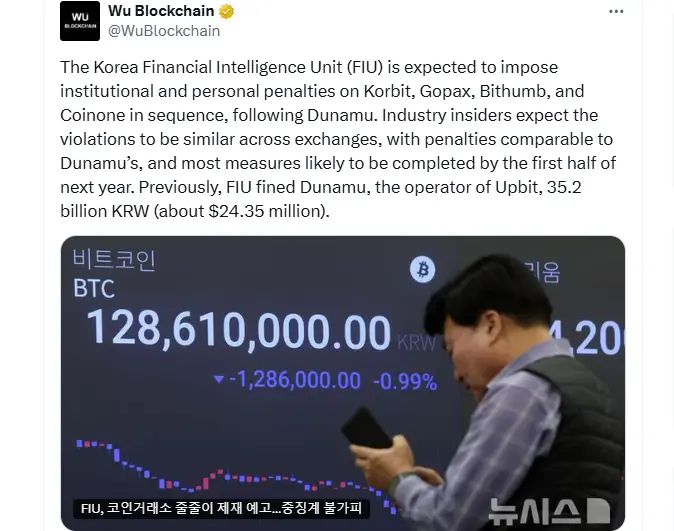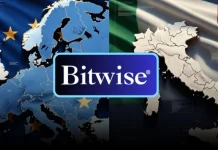
South Korea’s financial watchdog is preparing to issue a new round of penalties against major domestic cryptocurrency exchanges after uncovering broad violations of anti-money laundering (AML) rules. The Korea Financial Intelligence Unit (FIU) is finalizing sanctions against Korbit, Gopax, Bithumb, and Coinone, following its landmark action against Dunamu, the operator of Upbit.

Korea FIU Readies Sanctions Against Key Crypto Exchanges (Source: X)
The decisions will follow a strict “first-in, first-out” approach based on the order of on-site inspections conducted over the past year. Regulators and industry analysts expect that the severity of penalties will mirror the Dunamu case, reflecting widespread compliance gaps across the sector.
FIU Moves Through Exchange Inspections in Sequential Order
According to local regulatory sources, the FIU has nearly completed a multi-exchange inspection cycle that reviewed AML compliance, Know Your Customer (KYC) procedures, and suspicious-transaction reporting. Inspections were carried out in the following order:
- Dunamu (Upbit): August 2024
- Korbit: October 2024
- Gopax: December 2024
- Bithumb: March 2025
- Coinone: April 2025
Because the FIU assigns sanctions in the order inspections were conducted, Korbit is expected to be next, followed by Gopax, Bithumb, and Coinone. Bithumb may experience a delay due to an additional review of its order-book operations, but it remains part of the same enforcement cycle.
Most legal reviews and sanction-deliberation meetings are now underway. Officials expect all major decisions to conclude by the first half of 2026, marking one of the largest coordinated enforcement actions in Korea’s virtual asset sector.
Dunamu Case Sets Benchmark for Penalties
The sanctions against Dunamu provide the clearest reference point for what other exchanges may face. The FIU found significant breaches of AML requirements, including:
- 5.3 million cases of incomplete or flawed KYC verification
- 3.3 million transactions approved without full customer verification
- 15 failures to file suspicious-transaction reports
As a result, Dunamu received:
- A disciplinary warning for the CEO
- A three-month ban on onboarding new customers or processing new deposits/withdrawals
- A ₩35.2 billion (US$24.35 million) fine issued on November 6, 2025
Industry insiders say the inspection criteria were “largely identical” across exchanges, making similar violations highly probable. The FIU has already indicated that institutional and personnel sanctions will follow the same sequence as Dunamu’s case: individual accountability first, then corporate penalties, followed by monetary fines.
Exchanges Face Heavy Fines and Operational Restrictions
Regulators expect penalties for Korbit, Gopax, Bithumb, and Coinone to include:
- Institutional sanctions
- Personnel sanctions for executives or compliance officers
- Operational restrictions depending on severity
- Fines potentially reaching hundreds of billions of won
The size of fines will depend on the number and seriousness of AML violations uncovered during inspections. Exchanges with delayed or inadequate KYC systems, insufficient monitoring tools, or unreported suspicious activity are likely to face the steepest penalties.
Market analysts note that these actions indicate a coordinated regulatory push to strengthen oversight at a time when Korea’s crypto sector holds one of the world’s highest trading volumes relative to population size.
Broader Oversight Push Comes as Policy Debates Intensify
The upcoming sanctions coincide with broader policy debates in Korea about the future of virtual-asset regulation. Officials have acknowledged that infrastructure gaps remain in the country’s long-delayed crypto tax regime, originally scheduled for January 2027. Discussions of a fourth postponement are ongoing amid concerns about system readiness.
At the same time, policymakers are working to demonstrate support for innovation. The ruling Democratic Party recently launched a new crypto task force aimed at fostering growth in blockchain and digital assets, signaling a dual approach of enforcement and development.
For now, the FIU’s enforcement cycle represents the most significant regulatory tightening in Korea’s crypto market since the Special Financial Transactions Act was expanded to cover virtual assets. With four major exchanges awaiting decisions, compliance standards are expected to rise sharply as firms prepare for the next stage of oversight.



